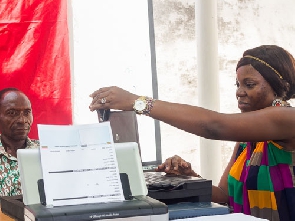The YAFO Institute, a think tank promoting libertarian ideas and free enterprise research in Ghana, has criticised the Electoral Commission (EC) for limiting the registration exercise at its district offices.
The president of the think tank, Nathaniel Dwamena, said the current approach being used to register the voters will displace them on election day.
Speaking on Frontline on Rainbow Radio 87.5 FM, he said the decision by the EC to restrict the exercise in its district offices will not disenfranchise eligible voters but displace those who will register.
He told host Kwanema Agyapong that extending the exercise does not allow more people to register, in their respective electoral areas, but further informs them of where they will vote in an election.
The EC’s current approach would require them to allocate resources to educate voters on where to vote, rather than saving resources if they had used the electoral areas, he argued.
”This is a long process, and on election day, when a voter is frustrated in searching for the centre to vote, the person will give up and boycott the election. The EC should have used the electoral areas because what they are doing will disenfranchise eligible voters.”
He said we should not allow the EC to embark on an exercise that will cause financial loss to the state while citing the Bank of Ghana’s incident as an example where the central bank used Ghc 132 million for a communication exercise.
”Using the polling station for the exercise is cheaper and simpler because it is in the electoral areas where the voters reside. Also, the polling stations sometimes have to be sorted in cases where there are about four different voting centres in one location. So imagine a voter who registered at the district office of the EC but did not know where to vote. The person would be frustrated and end up boycotting the process.”
He stated that polling stations are strategically located near voting residents, allowing existing voters to verify the identity of new voters up to a maximum of 10 people, in line with C.I. 91 (as amended by C.I. 126).
”The polling stations serve as the principal places to cast a ballot and are strategically situated in close proximity to voting residents. This close proximity makes it easier for existing voters to guarantee the identity of new voters, up to a maximum of 10 people, in accordance with C.I. 91 (as amended by C.I. 126).
Consequently, the process of voter registration is made more accessible, sparing new registrants the burden of transporting two guarantors to the district office. Moreover, this approach ensures efficient resource allocation by preventing unnecessary expenditures on voter education by EC regarding future polling locations.”
Click to view details



General News of Wednesday, 20 September 2023
Source: rainbowradioonline.com

















